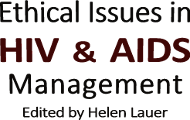ETHICAL ISSUES IN HIV & AIDS MANAGEMENT
Submitted 2013
Edited by Helen Lauer
Edited by Helen Lauer
Appendices: Unit04Appendices.pdf • Unit05Appendices.pdf
Unit06Appendices.pdf • Unit09Appendices.pdf • Unit11Appendices.pdf
Unit06Appendices.pdf • Unit09Appendices.pdf • Unit11Appendices.pdf
In the Western medical tradition, ever since Hippocrates (400 BC) wrote the famous oath to Apollo and Aesculapius, the ancient gods of health and healing crafts, the profession has been swamped with declarations, covenants, conventions and codes of ethics meant to govern practitioners' and stakeholders' conduct. One such code is the American Medical Association's code of medical ethics; the other is a list of medical patients' rights and responsibilities.
Rather than rehearse and memorize a code of care, this course provides you with principles to articulate and clarify your own judgments, to develop the confidence for thinking about problems that arise in relation to health care more generally as well as HIV and AIDS, so that you can make your own decisions and choices about care and good professional conduct.
A lot of what is assumed to be common knowledge and is treated as indisputable because it generates from the global arena, or because they are taken to be common knowledge — concerning illness, early mortality, chronic contagions, child health, infant mortality, HIV and AIDS in Africa — actually falls short of scientifically established fact or hypothesis adequately supported by relevant evidence. To appreciate this, it will help you to have some basic understanding of how facts, causal hypotheses and explanations are established scientifically.

Rather than rehearse and memorize a code of care, this course provides you with principles to articulate and clarify your own judgments, to develop the confidence for thinking about problems that arise in relation to health care more generally as well as HIV and AIDS, so that you can make your own decisions and choices about care and good professional conduct.
A lot of what is assumed to be common knowledge and is treated as indisputable because it generates from the global arena, or because they are taken to be common knowledge — concerning illness, early mortality, chronic contagions, child health, infant mortality, HIV and AIDS in Africa — actually falls short of scientifically established fact or hypothesis adequately supported by relevant evidence. To appreciate this, it will help you to have some basic understanding of how facts, causal hypotheses and explanations are established scientifically.


